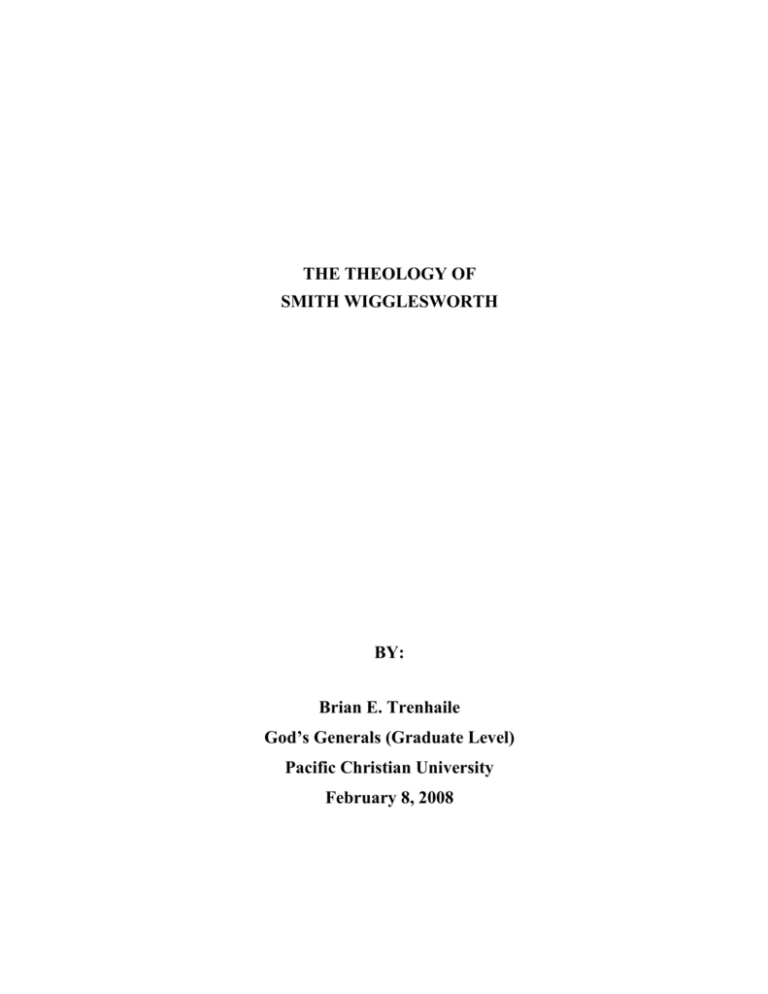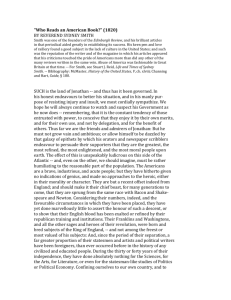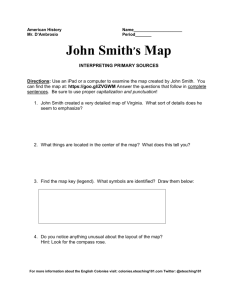
THE THEOLOGY OF
SMITH WIGGLESWORTH
BY:
Brian E. Trenhaile
God’s Generals (Graduate Level)
Pacific Christian University
February 8, 2008
TABLE OF CONTENTS
INTRODUCTION ................................................................................................................ 3
I.
His Primary Relationship ............................................................................................. 3
Smith Depended Wholly Upon God ............................................................................ 4
Scripture Meditation Helps Build a Relationship with God ......................................... 4
Prayer and Praise were His Lifestyle ........................................................................... 5
Holiness Crucial for Communion with God ................................................................ 5
II.
His Attitudes towards Faith ......................................................................................... 6
The Audacity of His Faith ........................................................................................... 6
Deep Love Combined with Faith ................................................................................ 6
His Definition of Faith ................................................................................................. 6
Faith Requires Action .................................................................................................. 7
Feeling Not Required .................................................................................................. 7
III.
Dogged Determination ................................................................................................. 7
Biblical Examples ........................................................................................................ 7
Contemporary Examples ............................................................................................. 8
CONCLUSION ..................................................................................................................... 9
BIBLIOGRAPHY ................................................................................................................. 10
2
THE THEOLOGY OF SMITH WIGGLESWORTH
INTRODUCTION
Smith Wigglesworth obtained his theology from the Bible and by walking in the Spirit
(cf. Wigglesworth, 82). The Bible is the only book he read (cf. Liardon, God’s Generals, back
cover). Lester Sumrall says Smith even banned newspapers from entering his home. He also
said that Smith devoted himself to reading the Word and praying (also cf. Wigglesworth, 102).
Smith did this over and over again throughout the day (cf. Sumrall).
As Smith meditated on Bible passages the Holy Spirit gave him revelation after
revelation. These revelations were simple while, at the same time, deep and profound.
His close relationship with God, along with an intimate knowledge of His ways, helped to
powerfully equip Smith for dynamic worldwide ministry.
I.
HIS PRIMARY RELATIONSHIP
The close relationship that Smith Wigglesworth had with God was the source of his
motivation and the phenomenal power that was demonstrated in his life (cf. Wigglesworth, 13).
Smith’s relationship was very similar that to what “John the Beloved” had with Jesus. Both were
not formally educated and came from lay backgrounds (cf. Wigglesworth, 33, 103). John was a
fisherman and Smith was a plumber. Both received religious training while young, but they did
not receive any formal college education. So these men naturally had a tendency to depend on
their relationship with the Lord rather than their background or education. Paul the apostle, who
had the very best in education, confirmed idealness of the path that John and Smith walked.
But whatever things were gain to me, those things I have counted as loss for the
sake of Christ. More than that, I count all things to be loss in view of the
surpassing value of knowing Christ Jesus my Lord, for whom I have suffered the
3
loss of all things, and count them but rubbish so that I may gain Christ, and may
be found in Him, not having a righteousness of my own derived from the Law,
but that which is through faith in Christ, the righteousness which comes from God
on the basis of faith, that I may know Him and the power of His resurrection and
the fellowship of His sufferings, being conformed to His death (Philipians 3:7-10,
NASB).
Paul did not say education was bad, he said that cultivating a close relationship with God
is exceedingly more important. Smith believed that God required character from his servants
and that formal education was not necessarily required.1
Smith Depended Wholly Upon God
Signs and wonders followed Smith’s ministry (cf. Liardon, God’s Generals, 195-226).
Smith attributes this to His relationship with God. He was totally dependent upon God.
A baby takes all that comes to it. A prudent man lets his reason cheat him out of
God’s best. But a baby takes all that its mother brings and tries to swallow the
bottle and all. The baby can’t walk, but the mother carries it; the baby can’t dress
itself, but the mother dresses it. The baby can’t even talk. So in the life of the
Spirit, God undertakes to do what we cannot do. We are carried along by Him,
He clothes us, and He gives us utterance. Would that we all had the simplicity of
the babes (Wigglesworth, 100-101).
Scripture Meditation Helps Build a Relationship with God
Smith wisely allowed the Holy Spirit to bring revelation to him as he meditated on the
scriptures (cf. Wigglesworth, 106). With meditation we can come to the place where Smith said,
“The purpose of all scripture is to move us on to this wonderful and blessed elevation of faith
where our constant experience is the manifestation of God’s life and power through us”
(Wigglesworth, 76). The following comments stem from his meditating on Christ’s resurrection:
Our Christ is risen. He is a living Christ who indwells us. We must not have this
truth merely as theory; Christ must be risen in us by the power of the Spirit. The
power that raised Him from the dead must animate us; and as this glorious
resurrection power surges through your being, you will be freed from all
weaknesses and you will become strong in the Lord and in the power of His
1
Smith said, “It does not take a cultured or learned man to fill a position in God’s church; what God requires is a
yielded, consecrated, holy life, and He can make of such a flame of fire (Wigglesworth, 103).
4
might. There is a resurrection power that God wants you to have and to have it
today. Why not? Receive your portion here and now” (Wigglesworth, 70).
Prayer and Praise were His Lifestyle
Smith loved to pray. Many of his sermons clearly reflected his deep love and
appreciation for prayer.2 Smith said, “It is only when men have learned the secret of prayer, of
power, and of praise, that God comes forth” (Wigglesworth, 68).
Holiness Crucial for Communion with God
Smith viewed holiness as an essential and central part of the Christian life. As a result,
his ministry never fell into disrepute like some of God’s other generals.
Smith said, “When we are in the presence of God, when God is working mightily in our
midst, there comes a great fear, a reverence, a holiness of life, a purity that fears to displease
God” (Wigglesworth, 87). He also said, “The Holy Spirit begins in the heart, right in the depths
of our human affections. He brings into the heart the riches of the revelation of Christ,
implanting purity and holiness there, so that, out of its depths, praises may well up continually”
(Wigglesworth, 94-95). Other aspects of his theology on holiness are reflected as follows:
First our faith comes through the righteousness of God. Note that righteousness
comes first and knowledge afterwards. It cannot be otherwise. If you expect any
revelation from God apart from holiness, you will only have a mixture. Holiness
opens the door to all the treasures of God. He must first bring us to a place where
we, like our Lord, love righteousness and hate iniquity before He opens us to
these good treasures. When we regard iniquity in our hearts, the Lord will not
hear us; and it is only as we are made righteous and pure and holy through the
precious blood of God’s Son that we can enter into the of holiness and
righteousness in the Son” (Wigglesworth, 79).
2
What was the difference between Daniel and the king that night when Daniel was put in the den of lions? Daniel
knew, but the king was experimenting. The king came around the next morning and cried, “O Daniel, servant of the
living God, is thy God, whom thou servest continually, able to deliver you from the lions?” Daniel answered, “My
God hath sent his angel, and hath shut the lions’ mouths.” The thing was done. I was done when Daniel prayed
with his windows open toward heaven. All our victories are won before we go into the fight. Prayer links us to our
lovely God, our abounding God, our multiplying God. Oh, I love Him! He is so wonderful! (Wigglesworth, 78-79).
5
II.
HIS ATTITUDES TOWARDS FAITH
Smith is often and rightly called the “Apostle of Faith.” Much can be learned from his
interesting attitudes regarding this subject.
The Audacity of His Faith
In one of his sermons, Smith said the following: “I am not moved by what I see. I am
moved only by what I believe. No man looks at appearances if he believes. No man considers
how he feels if he believes. The man who believes God has it” (Wigglesworth, 30).
He also said, “If you will dare to believe God’s Word, you will see performance of His
Word that will be truly wonderful. Here we have with the centurion an audacity of faith, a faith
that did not limit God. Failures come when we limit the Holy One of Israel” (Wigglesworth, 65).
Deep Love Combined With Faith
Paul said, “The only thing that matters is faith working through love” (cf. Galatians 5:6).
Smith had compassion for the multitudes and he combined this compassion with his faith.
Smith’s commentary on I John 5:3, 4 follows, “He that believes Jesus is the Christ overcomes the
world. It is a faith that works by love” (Wigglesworth, 13). Smith recommended praying to get
a revelation about God’s love and the benefits that this loves brings.3
His Definition of Faith
Smith had a very interesting take on faith. In the Spirit, Smith wonderfully combined
several Bible verses (Romans 10:17, John 16:13, James 1:21, I Peter 2:24, Matthew 8:17,
Colossians 3:4 and perhaps some other verses) to make the following definition for faith:
3
“It is impossible to comprehend the love of God as we think on natural lines. We must have the revelation from
the Spirit of God. God giveth liberally. He that asketh, receiveth. God is willing to bestow on us all things that
pertain to life and godliness. Oh, it was the love of God that brought Jesus. And it is the same love that helps you
and me believe. In every weakness God will be your strength. You who need His touch, remember that He loves
you. Look, wretched, helpless, sick one, away to the God of all grace whose very essence is love, who delights to
give liberally all the inheritance of life and strength and power that you are in need of” (Wigglesworth, 13-14)
6
You ask, “What is faith?” Faith is the principle of the Word of God. The Holy
Spirit, who inspired the Word, is called the Spirit of Truth. As we receive with
meekness the engrafted Word, faith springs in our heart – faith in the sacrifice of
Calvary, faith in the shed blood of Jesus, faith in the fact that He took our
weakness upon himself, has borne our sicknesses and carried our pains, and that
He is our life today” (Wigglesworth, 53-54).
Faith Requires Action
Faith must act to receive an impartation of power. Regarding Matthew 5:29-31 and Luke
8:45-47, Smith made the following comment about the woman with the issue of blood: “The
impartation of this power produces everything you need; but it comes only as our faith moves out
for its impartation. Faith is the victory. If you can believe it is yours” (Wigglesworth, 80).
Feelings Not Required
Smith said feelings should not be the source of faith.4 His comments are similar to
Campus Crusade’s train analogy. The analogy is the “locomotive” represents “fact” (i.e. the
Word of God), the “coal car” represents “faith,” and the ”caboose” represents “feelings.” The
train can run with just the locomotive and coal car, the caboose is not required.
III.
DOGGED DETERMINATION
Smith often talked about perseverance. Perseverance was deeply imbedded in his
theology. He preached about Biblical examples, and he also illustrated the concept with people
who lived during his lifetime.
Biblical Examples
Trials require perseverance. Smith had the following to say regarding trials we face:
Dare you believe God? Dare you stand on the record of His Word? What is the
record? If thou shalt believe thou shalt see the glory of God. You will be sifted as
4
“Did you believe before you were saved? So many people would be saved, but they want to feel saved first. There
is never a man who felt saved before he believed. God’s plan is always this: If you shall believe, you shall see the
glory of God. I believe God wants to bring us all to a place of unswerving faith and confidence in Himself”
(Wigglesworth, 12).
7
wheat. You will be tried as though some strange thing tried you. You will be put
in places where you will have to put your whole trust in God. There is no such
thing as anyone being tried beyond what God will allow. Temptation will come
but God will be with you right in the temptation to deliver you; and when you
have been tried, He will bring you forth as gold. Every trial is to bring you into a
greater position in God. The trial that tries your faith will take you on to the place
where you will know that the faith of God will be forthcoming in the next test …
If you are of sure ground, if you are counting on the presence of the living Christ
within, you can laugh when you see things getting worse. God would have you
settled and ground in Christ, and it is only as you are filled with the Holy Spirit
that you become steadfast and unmovable in Him” (Wigglesworth, 73-74).
Smith loved the story of the Syrophoenician woman. She asked Jesus to cast the demon
out of her daughter, and Jesus insulted her by calling her a dog. But she would not back off and
said, “Lord even the puppies get to eat the crumbs that fall off the table.” Jesus replied, “For this
your daughter is well,” and it was so (cf. Matthew 15:25-27, Mark 7:26-28).
Contemporary Examples
He told the story of a young lady with a goiter on her neck. She went up for prayer at one
of his meetings. This woman thanked God for her healing. A year later she came to another
meeting, stood and gave testimony thanking God for her wonderful healing, but the goiter was
still there. Two years later she came to another meeting and said “It is grand to be healed by the
power of God,” but it appeared that the goiter had gotten worse. Someone remonstrated her
about her beliefs. So she went home and prayed to God, “Lord you so wonderfully healed me
two years ago. Won’t you show all the people that you healed me.” Then she went to sleep.
When she woke up in the morning there was no trace of the goiter (cf. Wigglesworth, 77-78).
Here is a vivid example of Smith’s own perseverance: He was brought to a man who was
already dead. Smith propped a dead man up against a wall and told him to rise in the name of
Jesus. When he released the man, he collapsed to the floor, because he was dead. So Smith
propped him up against the wall again and told him again to rise in the name of Jesus. The man
again collapsed to the floor dead. So Smith picked him up for the third time, propped him
8
against the wall and told him to rise in the name of Jesus. For the third time, this man fell to the
floor. But this time, after a while, his eyes started to move and he eventually got up and he lived
(Liardon, God’s Generals DVD).
CONCLUSION
Smith Wigglesworth lived a supernatural life that was accompanied by many powerful
manifestations. His key to success was his close relationship with the Holy Spirit similar to what
Jesus had with the Father. Faith developed as a result of this deep relationship God. With this
faith came signs and wonders, also similar to Jesus.
Smith prophesied that there would be a huge end time harvest. He said that this harvest
would be characterized by an explosion of knowledge in God’s word in addition to an
outpouring of the Holy Spirit with signs and wonders (Sumrall). Today’s Christians need
impeccable character like Smith. This can only be accomplished by being strong in the Word
and continuously walking in the Spirit. Smith was strong in the Word and walked in the Spirit:
He remains a timeless example of unwavering faith and perserverance.
9
BIBLIOGRAPHY
Wigglesworth, Smith. Ever Increasing Faith, Revised Edition. Springfield, Missouri: Radiant
Books, Gospel Publishing House, 1971.
Liardon, Roberts. God’s Generals: Why They Succeeded and Why Some Failed, Reprint Edition.
New Kensington, Pennsylvania: Whitaker House, 1996.
Liardon, Roberts. God’s Generals: DVD Teachings. Laguna Hills, California: Roberts Liardon
Ministries, circa. 2000.
Sumrall, Lester. Message about Being Personally Mentored by Smith Wigglesworth, from God’s
Generals: DVD Teachings. South Bend, Indiana: LeSEA Broadcasting, circa. 2000.
Unless otherwise indicated, all scriptural quotations are from the King James Version of the
Bible.
Scripture references marked NKJV are taken from the NEW KING JAMES VERSION,
Copyright © 1979, 1980, 1982, by The Thomas Nelson, Inc. Used by permission. All
rights reserved.
Scripture references marked NASB are taken from the NEW AMERICAN STANDARD
BIBLE®, Copyright © 1960,1962,1963,1968,1971,1972,1973,1975,1977,1995 by The
Lockman Foundation. Used by permission.
Scripture quotations marked AMP are taken from the Amplified® Bible, Copyright © 1954,
1958, 1962, 1964, 1965, 1987 by The Lockman Foundation. Used by permission."
(www.Lockman.org).
10
Scripture references marked NIV are taken from the HOLY BIBLE, NEW INTERNATIONAL
VERSION ®. NIV ®. Copyright © 1973, 1978, 1984 by the International Bible Society.
Used by permission of Zondervan Publishing House. All rights reserved.
Scripture references marked NLT are taken from the NEW LIVING TRANSLATION ®. NLT
®. Copyright © 1996, 2004 by the Tyndale Charitable Trust. Used by permission of
Tyndale House Publishers. All rights reserved.
11










